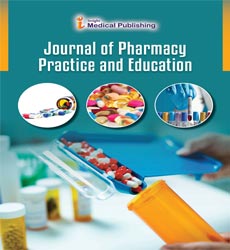Impacts of Post-COVID Period in Future
Srihari Konduri*
Department of Pharmaceutical Chemistry, University of California, San Diego, USA
- *Corresponding Author:
- Srihari Konduri
Department of Pharmaceutical Chemistry
University of California
San Diego, USA
E-mail: sri.konduri@ucsd.edu
Received Date: July 07, 2020; Accepted Date: July 23, 2020; Published Date: July 30, 2020
Citation: Konduri S (2020) Impacts of Post-COVID Period in Future. J Pharma Prac Edu Vol.3 No.2:e027. DOI: 10.36648/pharmacy-practice.3.2.e027
Copyright: © 2020 Konduri S. This is an open-access article distributed under the terms of the Creative Commons Attribution License, which permits unrestricted use, distribution, and reproduction in any medium, provided the original author and source are credited.
Editorial
In the short term, we expect to see temporary demand and operational disruptions leading to revenue losses for PPPs. We can also expect delays in construction schedules due to supplyside issues such as labor, equipment, and raw material disruptions for PPPs under construction.
Medium-term impacts can be mitigated with instruments such as bridge financing, capital injections, renegotiation of key project parameters, including contract duration, and introducing regulatory flexibility on milestones and performance indicators, among others.
In case of longer-term changes, adjustments in existing PPP contracts will not be possible without proactive steps made by governments and lenders given the limited flexibility in PPP contracts to adjust to drastic changes [1]. Among the state measures targeting at supporting the infrastructure market there are the prolongation of the term of certain licenses and authorizations, right of a tenant to demand reduction of the rental charges.
Beyond all these results, in many public infrastructure projects compensation payment will be the main subject of PPP projects. Because of disruption of the payment caused by force majeure, most of governments must provide their guaranteed payments to senior lenders.
Unfortunately, in many projects data collected from existing PPP projects showed us the vulnerability scope and that the extent of this force majeure risk was not foreseen in PPPs that rely on revenues generated by user fees. When we analyses the impact of covid-19 period on sea ports, airports, tolls roads, we will see unpredictable data results in terms of generating money from these assets [2]. The other PPP model which is based on the revenue through availability payments may undergo in the long term as governments that result in lost tax revenues and less treasury and budget resources to repay their availability commitment payments.
The decrease the number of users who use airports, pass through tunnels or bridges or use ports for global trade will also have a negative effect on the cash flow of PPP projects. In terms of better preparation for the future, we should develop short medium and long term recovery plans in order to reduce impacts of covid-19 on economies and PPPs [3].
This is not right to transfer all risks that occurred due to Covid-19 outbreak to the public party. All partners, all stakeholders should take steps to understand and manage the issues related to them. Beyond all this, failure of PPP projects should not be an option. In order to successfully sustain the continuity of PPP projects, private sector must be encouraged to approach their public sector partners giving security to the infrastructure market [4], governments must proactively pursue the communication with their private sector partners to mitigate PPP project impacts as soon as possible. As infrastructure sector is facing the most powerful crisis today, engagement with all stakeholders to optimize recovery actions becomes very crucial for the success of projects.
Strategic recovery plans must focus on a win-win recovery approach that is includes the needs of both the public and private sectors, which are harmonized with national strategic priorities [5].
However we are aware of the fact that governments’ interventions are usually like a doubled-edged sword which may lead to moral hazard. With increased concern around the impact of COVID-19, PPP project companies and sponsors need to consider the implications for their rights and obligations under the project agreements which they are party to.
References
- Munster VJ, Koopmans M, van Doremalen N, van Riel D, de Wit E (2020) A novel coronavirus emerging in China-key questions for impact assessment. N EnglJMed.
- World Health Organization (2003) First data on stability and resistance of SARS coronavirus compiled by members of WHO laboratory network. World Health Organization, Geneva, Switzerland.
- Novel coronavirus Disease (covid-19) (2020) Situation Update Report-22.
- Coronavirus disease 2019 (COVID-19) (2020).
- Pan-american unity-vs-cv-19 (2020) Live cast from Mexico, Colombia, Ecuador, El-Salvador, Brazil, Canada & USA.
Open Access Journals
- Aquaculture & Veterinary Science
- Chemistry & Chemical Sciences
- Clinical Sciences
- Engineering
- General Science
- Genetics & Molecular Biology
- Health Care & Nursing
- Immunology & Microbiology
- Materials Science
- Mathematics & Physics
- Medical Sciences
- Neurology & Psychiatry
- Oncology & Cancer Science
- Pharmaceutical Sciences
